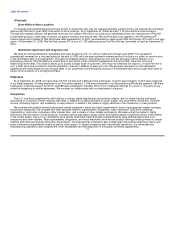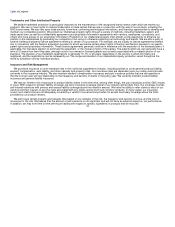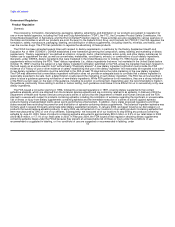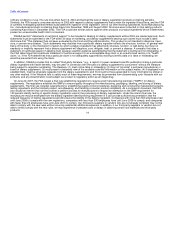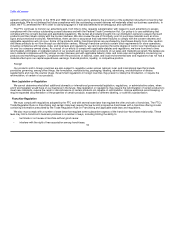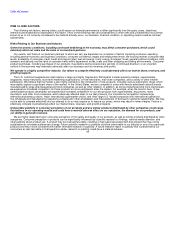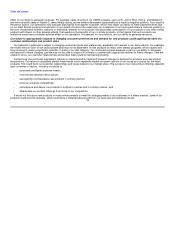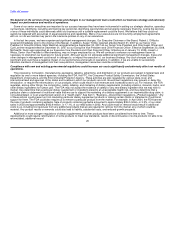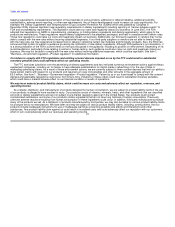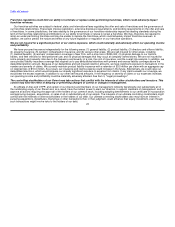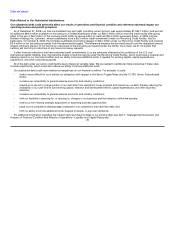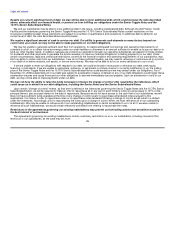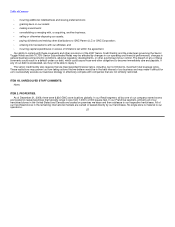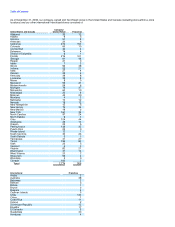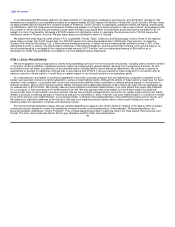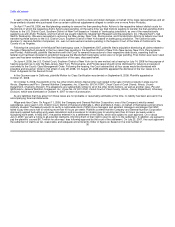GNC 2009 Annual Report Download - page 26
Download and view the complete annual report
Please find page 26 of the 2009 GNC annual report below. You can navigate through the pages in the report by either clicking on the pages listed below, or by using the keyword search tool below to find specific information within the annual report.
Table of Contents
keeping requirements, increased documentation of the properties of some products, additional or different labeling, additional scientific
substantiation, adverse event reporting, or other new requirements. Any of these developments could increase our costs significantly. For
example, the Dietary Supplement and Nonprescription Drug Consumer Protection Act (S3546) which was passed by Congress in
December 2006, imposes significant new regulatory requirements on dietary supplements including reporting of "serious adverse events" to
FDA and recordkeeping requirements. This legislation could raise our costs and negatively impact our business. In June 2007, the FDA
adopted final regulations on GMPs in manufacturing, packaging, or holding dietary ingredients and dietary supplements, which apply to the
products we manufacture. These regulations require dietary supplements to be prepared, packaged, and held in compliance with certain rules.
These new regulations could raise our costs and negatively impact our business. Additionally, our third-party suppliers or vendors may not be
able to comply with the new rules without incurring substantial expenses. If our third-party suppliers or vendors are not able to timely comply
with the new rules, we may experience increased cost or delays in obtaining certain raw materials and third-party products. Also, the FDA has
announced that it plans to publish a guidance governing the notification of new dietary ingredients. Although FDA guidance is not mandatory, it
is a strong indication of the FDA's current views on the topic discussed in the guidance, including its position on enforcement. Depending on its
recommendations, particularly those relating to animal or human testing, such guidance could also raise our costs and negatively impact our
business. We may not be able to comply with the new rules without incurring additional expenses, which could be significant. See Item 1,
"Business—Government regulation—Product regulation" for additional information.
Our failure to comply with FTC regulations and existing consent decrees imposed on us by the FTC could result in substantial
monetary penalties and could adversely affect our operating results.
The FTC exercises jurisdiction over the advertising of dietary supplements and has instituted numerous enforcement actions against dietary
supplement companies, including us, for failure to have adequate substantiation for claims made in advertising or for the use of false or
misleading advertising claims. As a result of these enforcement actions, we are currently subject to three consent decrees that limit our ability to
make certain claims with respect to our products and required us to pay civil penalties and other amounts in the aggregate amount of
$3.0 million. See Item 1, "Business—Government regulation—Product regulation." Failure by us or our franchisees to comply with the consent
decrees and applicable regulations could occur from time to time. Violations of these orders could result in substantial monetary penalties,
which could have a material adverse effect on our financial condition or results of operations.
We may incur material product liability claims, which could increase our costs and adversely affect our reputation, revenues, and
operating income.
As a retailer, distributor, and manufacturer of products designed for human consumption, we are subject to product liability claims if the use
of our products is alleged to have resulted in injury. Our products consist of vitamins, minerals, herbs, and other ingredients that are classified
as foods or dietary supplements and are not subject to pre-market regulatory approval in the United States. Our products could contain
contaminated substances, and some of our products contain ingredients that do not have long histories of human consumption. Previously
unknown adverse reactions resulting from human consumption of these ingredients could occur. In addition, third-party manufacturers produce
many of the products we sell. As a distributor of products manufactured by third parties, we may also be liable for various product liability claims
for products we do not manufacture. We have been and may be subject to various product liability claims, including, among others, that our
products include inadequate instructions for use or inadequate warnings concerning possible side effects and interactions with other
substances. Any product liability claim against us could result in increased costs and could adversely affect our reputation with our customers,
which in turn could adversely affect our revenues and operating income.
21


